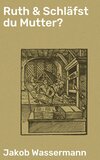Объем 680 страниц
О книге
In «The Goose Man,» Jakob Wassermann intricately weaves a compelling narrative that delves into the complexities of human emotion and the struggle for identity. Set against the backdrop of early 20th-century Europe, the story follows the life of a peculiar man who, burdened by the weight of societal expectations and personal crises, finds solace in his unconventional relationship with geese. Wassermann's lyrical prose and vivid imagery create a rich tapestry that reflects the existential dilemmas faced by individuals in a rapidly changing world, drawing parallels to the existentialism that would later dominate 20th-century literature. Jakob Wassermann, a significant figure in modern German literature, was born in 1873 and was profoundly influenced by his experiences as a Jewish writer in a tumultuous period of history marked by sociopolitical upheavals. His background imbued his works with a sense of introspection and a keen awareness of the human condition, compelling him to explore themes of alienation and self-discovery, as vividly illustrated in «The Goose Man.» This captivating novel is recommended for readers seeking a thoughtful exploration of individuality amidst societal constraints. Wassermann's poignant storytelling, combined with his astute observations of human nature, makes «The Goose Man» a timeless reflection that resonates with contemporary audiences. Immerse yourself in this remarkable tale that invites profound introspection and emotional connection.





















